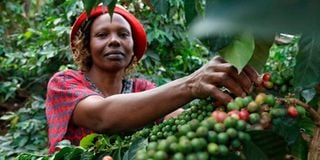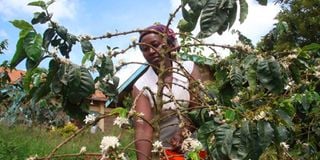Premium
Hope for coffee farmers as continuous harvesting signals better returns

Jane Maina tends to her coffee at Wakamata village in Nyeri County on October 13, 2021.
For the first time in the history of coffee picking, farmers have been harvesting their crop continuously - a new phenomenon that experts attribute to climate change.
From October last year when farmers started picking their produce, the coffee plants have maintained high production of berries and increased activities in factories.
This is despite the normal season ending in January.
At the Gachatha factory in Nyeri, Peter Mathenge, the chairman, said they closed picking for two weeks in March to service machines and they started picking again as coffee trees had ripe berries. Currently, farmers have delivered about 46, 000 kilos to the factory.
Traditionally, the early crop, also known as fly crop, is usually harvested between May and June while the main harvesting starts at the end of October all the way to early January.

Margaret Wahu tends a flowering coffee bush at Kiawamururu coffee factory in Nyeri County on March 10, 2020. Farmers are smiling to the bank after receiving Sh102.3 per kilo of the berry they delivered last season.
But the seasons keep shifting where the crops are experiencing early or late flowering as was the case this year.
Flowering occurs in January and February when the crop undergoes enough stress followed by the long rains in March which trigger berry production.
Increased production during the fly crop may lead to decreased production in the main harvest.
“We should be starting the picking of fly crop now but the climate change has affected the crop greatly such that we are picking coffee as we do during the main season,” said Mr Mathenge.
The farmers are hopeful that the increased production will result in higher payout by the end of the season.
He projects that this year, farmers will experience another coffee boom and earn higher from their produce. At his factory, he anticipates farmers will have achieved one million kilos before the close of the season.
“This will be a good coffee year too if the crop is not infested by cold related diseases such as coffee berry disease,” he said.
At the same time, Mr Joseph Mukuha of the Ndaroini Coffee Growers’ Association said that the farmers have already delivered a million kilos from the fly crop alone.
“We have experienced continuous coffee harvesting due to the good weather. The crops have undergone enough stress which boosts flowering and production. The temperatures are also favorable which has reduced diseases,” he said.
Diseases such as coffee berry disease, leaf rust and bacterial blight affect the coffee crops during the cold season and could reduce production by over 80 per cent.
Some farmers, through advice of their agronomists, have changed how and when they spray their coffee with chemicals to prevent diseases too as the coffee calendar has new been now altered.
Normally, the coffee calendar has two sessions where farmers pick their produce in May and the main crop in December. Erratic rainfall has also occasioned the ripening of berries at different stages while the plants undergo flowering simultaneously.





